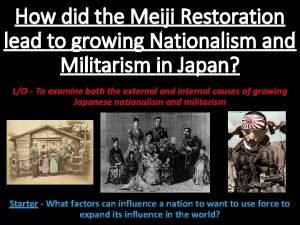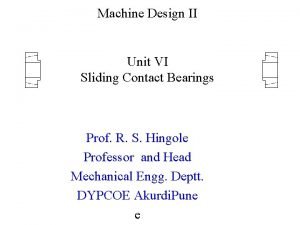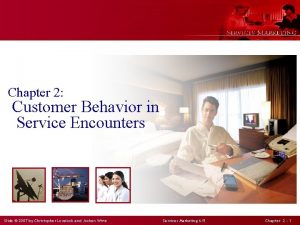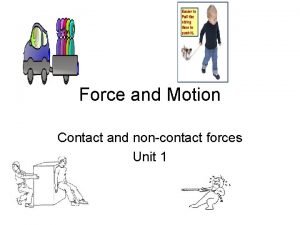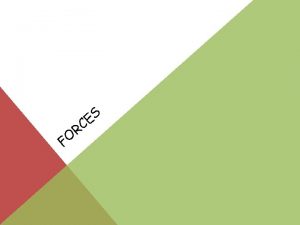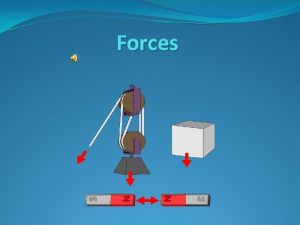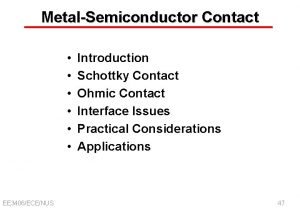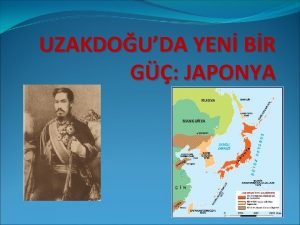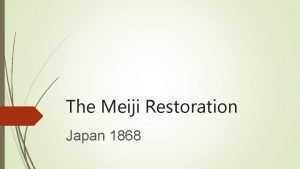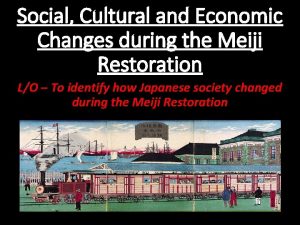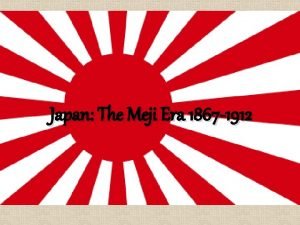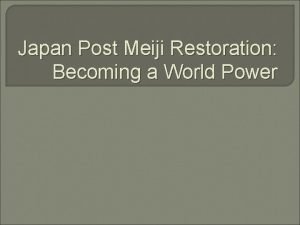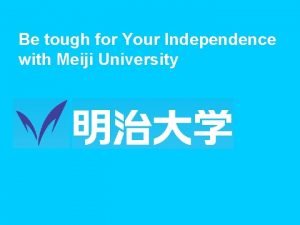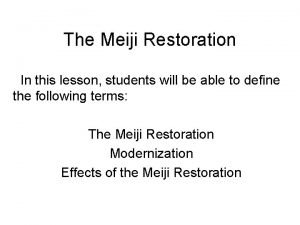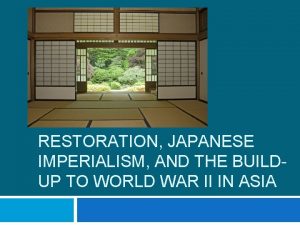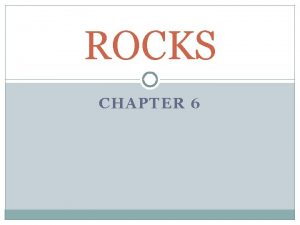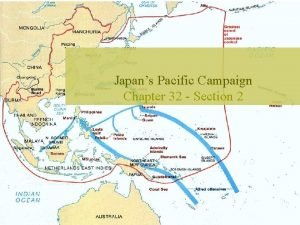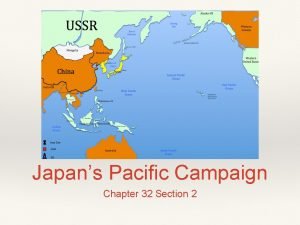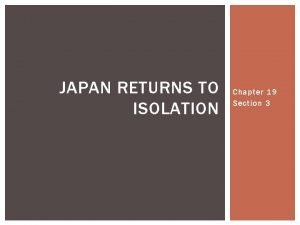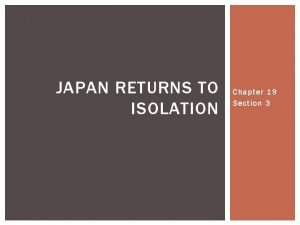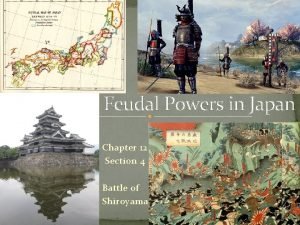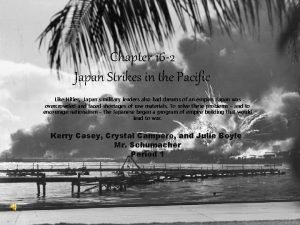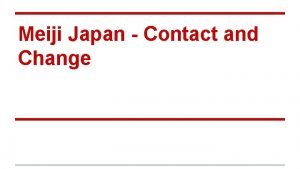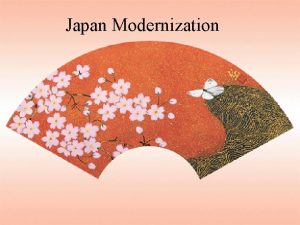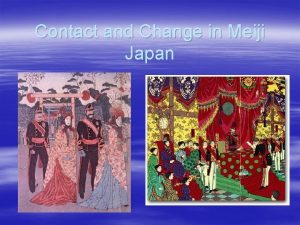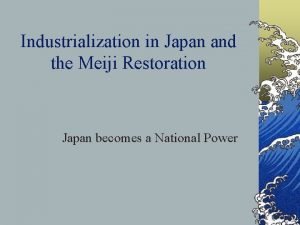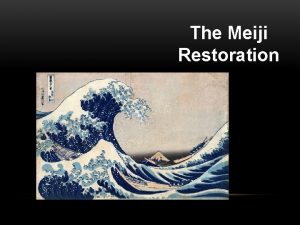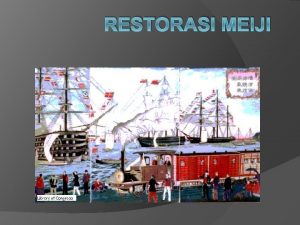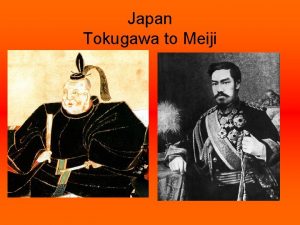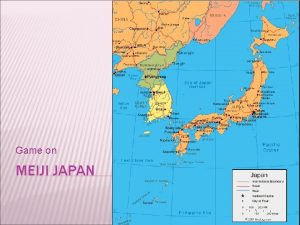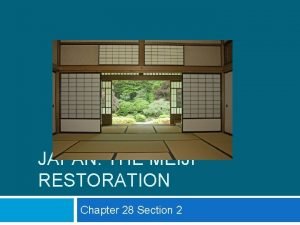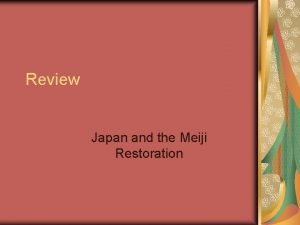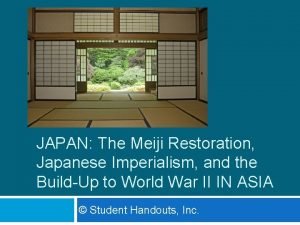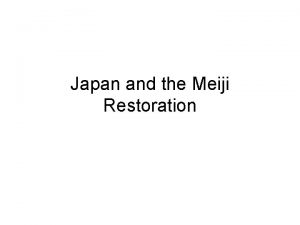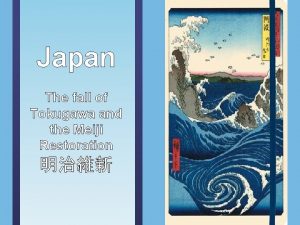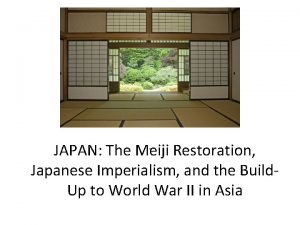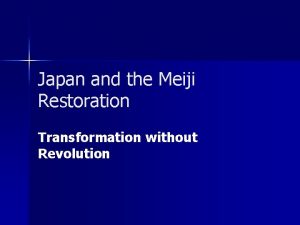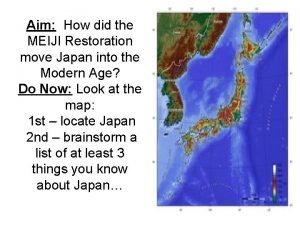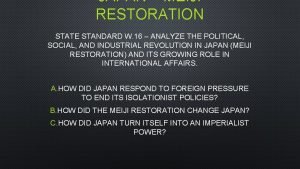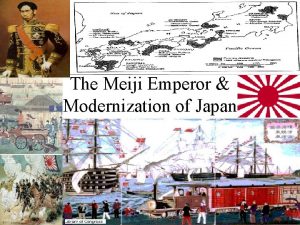Chapter 15 Contact and Change in Meiji Japan


































- Slides: 34

Chapter 15: Contact and Change in Meiji Japan Unit 3: From Isolation to Adaptation

Inquiry Question ► In what ways does a society’s worldview affect its ability to adapt to rapid change?

Contact and Change in Meiji Japan ► Read page 327 ► Cuba and USA

The End of Isolation ► Commodore Perry’s arrival was not the first time other countries wanted to trade with Japan. ► The Portuguese and Dutch had some success with trading with Japan. § Japan controlled this contact § The Dutch and Portuguese had to follow strict rules.

The End of Isolation ► British, Russian and American ships began to arrive to Japan. ► The Japanese response was to keep them out! § Using force when necessary.

The End of Isolation ► Perry’s visit was different…. ► The Japanese finally loses its battle to remain a closed and isolated society.

Perry’s Strategies ► Perry sailed into the Japanese’s habour with: § § 2 steamships 2 sail boats 977 men 66 guns ► The Japanese had never seen so many white men and guns before. § Most were very nervous.

Perry’s Strategies ► Perry and his men presented the shogunate a letter from their President Millard Fillmore. ► This letter had a list of demands for Japan to: § Trade with the USA § Protection for shipwrecked American sailors § Allow the USA to buy their coal

► Perry left Japan to allow the shogunate to think about his decision. § He left the 977 men in Japan to keep control. ► When Perry returned, one year later, he brought with him : § Eight ships § More men

► The shogunate felt very threatened and had no choice but to agree to the Americans’ demand. ► Shogunate and Perry signed the Treaty of Kanagawa. § Establish two ports in Japan for American ships § An American consulate (community) in Japan § Free trade between Japan and USA

► The same year Japan sign the Treaty with USA, Japan signed similar treaties other countries (England, France, Russia) ► Japan had lost control over their trade!

The Japanese Response to Perry ► Japan had held out against trade with other countries for hundreds of years. ► Why did the Japanese now decide to allow foreign trade?

► Reason 1: They were forced. § Perry’s intermediated them with his military strength § Americans had more advanced weapons ►Japan lose. did not want to start a war that they might

► Reason 2: Japan did not want to become another China. § There was a war between China and Britain as a result from trade. § Britain won the war. § As a result, China had to sign many unfair trade treaties with Britain and other European countries.

Disorder and Civil War ► Many people in Japan did not like the shogunate’s decision to sign a trade agreement with USA and other countries. § They viewed the shogunate as weak. ► People began to riot against the shogunate.

Disorder and Civil War ► The shogun finally decided to resign and have the emperor take over. ► Civil Japan broke out in Japan § People who wanted the shogun in power vs People who wanted the emperor in power ► In ►A the end, the emperor regain his power. new era in Japan was beginning!


Activity ► Create a T-chart to record the factors that motivated Japan to end its isolation. Record the outside factors in the left-hand column and the inside pressures in the righthand column. Chapter 14 provides additional insight into the inside pressures. § Do at least 3 factors on each column Factors that caused Japan to end its isolation. Outside Factors Inside Pressures

Changing Order

Changing Order

A Changing Order ► Prince Mutsuhito became the emperor of Japan. ► He was only 21 years old. ► Mustsuhito chose a new name for himself – Meiji = enlightened rule ► Emperor Meiji was in power until he died. (45 years in power)

New Ideas About the Government ► Now that Emperor Meiji is in power, he realized he need to make some drastic changes to Japan in order to keep Westerners from taking over Japan. ► Emperor Meiji and his oligarchy had two goals for Japan: § To create a strong government to unite the country § Model their government after the countries in the West.

► The Emperor Meiji and his oligarchy also made some other drastic changes: § Moved the government from Kyoto to Tokyo (Edo) § Daimyos had to give their land to the government. § Samurai system was abolished ►Need to find new jobs § Peasants and other commoners were given more freedom ► allowed to choose: § § their occupation where they live dress how they would like Own land

► Those many changes were made by Emperor Meiji, some things stayed the same: § Fathers continued to have legal authority for their family, making all the decisions. (marriage, education, jobs) § Class distinctions between the commoners and old upper classes remained. § Rural peasant life remain largely the same § Many people could not afford to send their children to school.


Survey ► https: //www. surveymonkey. com/r/39 BNR 87

Five Charter Oath Activity ► The Imperial council (Emperor’s advisors) created the goals of the new Japanese society in the Five Charter Oath. Page 338 – Exploring Sources The Five Charter Oath - Restate each of the terms in your own words

Five Charter Oath in your own words 1. The assembly will discuss all public matters by public discussion. / All matters will be decided by the people and be publicly discussed. ► 2. High and low classes will be united carrying out the administrations of the affairs of the state/ All classes shall be included in law making ► 3. All people will be able to find their own jobs and own their own land ► 4. Laws will be placed to prevent the bad nature of people/ Old laws of the past will now be stopped and everything will be based on the laws of nature ► 5. Knowledge from other countries shall be known by government. ►

Industrialization in Japan ► Japan was not technologically advanced as other countries, so Japan needed to catch up! ► Japan advanced their technology in a short amount of time.

Borrowing Technology ► Japan started to borrow ideas from other countries. ► Meiji leaders hired experts and advisors from around the world to build machines and factories as well as train Japanese workers. § Once the Japanese workers were trained the foreign experts had to leave the country immediately

► Japanese representatives also visited the USA and European countries. ► They went to study the Western culture. § They studied: ►Ship building ►Military science ►Construction ►Medicine ► After their travels, they came home and reported their findings to the government.


6. Define oligarchy (1) 7. Define Meiji (1) 8. What were the Meiji’s two goals? (2) 9. What happened to the samurai soldiers? (1) 10. Name two new rights the Peasants now have? (2) 11. Why was Japan so far behind in their technology compare to other countries at the time? (1) 12. Why did Japanese representatives visit Europe and the United States? (1)

 Japan before meiji restoration
Japan before meiji restoration Which force
Which force Sliding contact bearing and rolling contact bearing
Sliding contact bearing and rolling contact bearing Post encounter stage in service marketing
Post encounter stage in service marketing What are some contact forces and some noncontact forces?
What are some contact forces and some noncontact forces? Contact and non contact forces
Contact and non contact forces Contact vs non contact forces
Contact vs non contact forces Is tension contact or noncontact
Is tension contact or noncontact Paranochyia
Paranochyia Air resistance contact or noncontact
Air resistance contact or noncontact Ohmic contact
Ohmic contact Meiji restorasyonu yenilikleri
Meiji restorasyonu yenilikleri Meiji restoration
Meiji restoration 5 element of national identity
5 element of national identity Emperor shogun daimyo samurai peasants
Emperor shogun daimyo samurai peasants Meiji restoration
Meiji restoration Latar belakang terjadinya restorasi meiji
Latar belakang terjadinya restorasi meiji Meiji university ikuta campus
Meiji university ikuta campus Meiji restoration definition
Meiji restoration definition Define meiji restoration
Define meiji restoration Pelatih koa kunrenjo
Pelatih koa kunrenjo Evidence of chemical change
Evidence of chemical change Absolute change and relative change formula
Absolute change and relative change formula Differences between physical and chemical changes
Differences between physical and chemical changes Change in supply and change in quantity supplied
Change in supply and change in quantity supplied What is example of physical change
What is example of physical change Rocks change due to temperature and pressure change
Rocks change due to temperature and pressure change Whats a chemical change
Whats a chemical change First order of change
First order of change Chapter 32 japan pacific campaign
Chapter 32 japan pacific campaign Japan's pacific campaign chapter 32 section 2
Japan's pacific campaign chapter 32 section 2 Chapter 3 section 3 japan returns to isolation answer key
Chapter 3 section 3 japan returns to isolation answer key Chapter 19 section 3 japan returns to isolation answer key
Chapter 19 section 3 japan returns to isolation answer key Feudal powers in japan
Feudal powers in japan Chapter 16 section 2 japan strikes in the pacific
Chapter 16 section 2 japan strikes in the pacific
